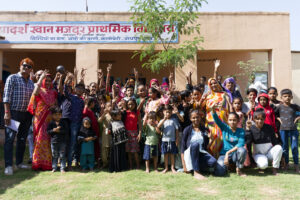Silicosis project
Background
The Thar Desert
The Thar Desert The Thar Desert in northwestern India, mainly in the state of Rajasthan, is an extremely dry and underdeveloped area. The landscape of Thar is barren with extremely unfriendly weather conditions – dry air and scorching heat throughout the year. Rainfall is rare in Thar and causes large food and water shortages. On average, the annual rainfall minimum of Thar is less than 200 mm. As a result, the region has long been affected by poverty, underdevelopment and poor health. About 25 million people live in Thar making it the most densely populated desert ecosystem in the world. Covering an area of 238,000 square kilometers, the Indian Thar Desert is also the largest desert in the world.
With these adversities and limited employment or income opportunities, quarrying is an important source of livelihood for the rural poor of Thar. An estimate suggests that nearly 2.5 million in the state work in various quarries and mines to earn daily wages and support their families.
Silicosis and Tuberculosis
Silicosis is a major health problem in the quarries of Rajasthan and endangers the lives of thousands of quarry workers. Silicosis and tuberculosis are two common respiratory diseases that quarry workers suffer from. Silicosis is a dust-borne disease that causes irreversible and fatal changes in lung tissue. Tuberculosis is contagious and is caused by Mycobacterium tuberculosis. Silicosis and tuberculosis are potentially life-threatening diseases. While tuberculosis can be fully treated with adequate medication, silicosis can only be palliatively supported. Quarry workers suffering from one of these diseases are in great danger of contracting another disease. The coexistence of silicosis and tuberculosis is known as silicotuberculosis, the prevalence of which is high in Rajasthan quarries. Over the years, silico-tuberculosis has profoundly affected the quarry communities, causing significant social and economic losses.
The Project
Overall objective
To contribute to reducing the incidence and prevalence of silicosis and tuberculosis in the Thar Desert quarries in India and to promote lung health in quarry communities.
Specific Goals
- Developing the knowledge and awareness of lung health among quarry workers and quarry owners in the Thar Desert region
- Improving the health status of Village Health Workers (VHWs) and medical services for quarry workers aiming at improved lung health.
- Improving the nutritional status of quarry workers through food gardens, training and capacity building
- Lobbying: We are contacting the local government and advocating better health care facilities for quarry workers
We document the best practices to promote lung health programs around the world.
Expected result
We expect the project to improve the lung health status of some 50,000 quarry workers and promote the replication of lung health care in other regions.
Implementing Organization
Gramin Vikas Vigyan Samiti (GRAVIS) or the People’s Center for Rural Development Research was founded in 1983 in the Jelu Gagadi village of Jodhpur, India, by a group of Gandhian development activists. The organization was established to organize rural development activities in the remote parts of the Thar Desert. At the beginning, GRAVIS began his work in a group of 20 villages in the district of Jodhpur in Rajasthan. Currently GRAVIS operates in more than 1,000 villages in 6 districts of the Thar Desert of Rajasthan, India. GRAVIS programs benefit over 1 million people in the Thar Desert.
GRAVIS activities focus on the poor, backward and marginalized parts of Thar desert communities, with particular emphasis on women, children and the elderly. GRAVIS is very concerned about children’s development, empowerment of women and gender equality.
More information about GRAVIS can be found at GRAVIS.
The project is financed by the generous donations of the Gebhard-Müller-Schule (SMV) and supporting groups.

